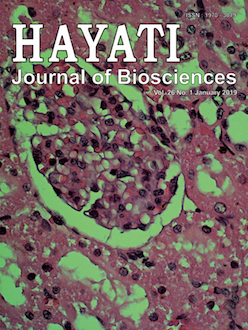Behavior, Histopathology and Physiological Responses of Rat Fed Diets Containing Growth Hormone Transgenic Fish Meal
Abstract
The animal model response against genetically modified product may provide food safety information. This study was performed to observe behavior, histopathology and physiological responses of Wistar rat fed on the diet containing growth hormone (GH) transgenic common carp (Cyprinus carpio) meal (Ccm). Thirty rats of three-month-old (BW: 115.67–139.50g) were divided into five treatments (six rats per treatment). The treatments were rats fed on the commercial diet without Ccm (control), a re-pelleted diet containing 15% (NT-15) and 45% non-transgenic Ccm (NT-45), a re-pelleted diet containing 15% (TG-15) and 45% GH transgenic Ccm (TG-45). Rats were kept for three weeks, fed twice a day according to treatment by 30 g/day/rat and water was provided ad-libitum. Rat behavior was observed every day during feeding. Serum glutamic oxaloacetic transaminase (SGOT), serum glutamic pyvuric transaminase (SGPT), urea, and creatinine were measured at initial and the end of the experiment. Histology observation was made for liver, kidney, and brain tissues. Our results showed that behavior, histopathology, SGOT, SGPT, urea and creatinine levels of rat fed with control, NT- and TG-Ccm diets were similar. All rats survived until the end of the experiment. Thus, within the dose level of this study, GH transgenic Ccm showed no toxicity or effect on behavior and physiology of Wistar rats.
Downloads
HAYATI J Biosci is an open access journal and the article's license is CC-BY-NC. This license lets others distribute, remix, tweak, and build upon author's work, as long as they credit the original creation. Authors retain copyright and grant the journal/publisher non exclusive publishing rights with the work simultaneously licensed under a https://creativecommons.org/

























.png) IPB University
IPB University Department of Biology
Department of Biology The Indonesian Biological Society
The Indonesian Biological Society 

